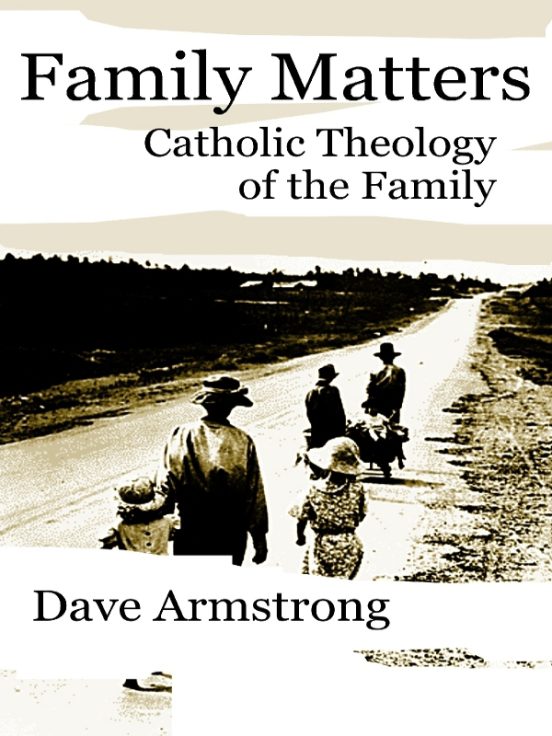Divorce | Homosexuality | Radical Feminism
(completed in December 2002; published by Lulu in April 2007)
—– To purchase, go to the bottom of the page —–
Table of Contents
Dedication
Introduction
Chapter One: Abortion
Chapter Two: Contraception
Chapter Three: Extramarital Sex
Chapter Four: Divorce
Chapter Five: Homosexuality
Chapter Six: Radical Feminism
Appendix One: G.K. Chesterton on Sex and Contraception:
The Surrender Upon Sex
Babies and Distributism
Sex and Property
Social Reform Versus Birth Control
Appendix Two: G.K. Chesterton on the Family:
On Certain Modern Writers and the Institution of the Family
The Free Family
The Wildness of Domesticity
The Emancipation of Domesticity
Appendix Three: G.K. Chesterton: The Superstition of Divorce
Appendix Four: 1930 Lambeth Conference of Anglican Bishops: Resolutions : The Life and Witness of the Christian Community – Marriage and Sex
Appendix Five: Subsequent Lambeth Conferences on Divorce, Contraception, Extramarital Sex, Homosexuality, the Ordination of Women, and Euthanasia
Appendix Six: Official Statements of Various Christian Denominations in Support of the Right to Abortion
Introduction
The subject matter of this book is fairly self-explanatory but perhaps a brief description of my purpose is in order. My goal is simple: to present a summary of Catholic teaching on the family and sexuality, from a “lay apologetics” standpoint; and to attempt to show why Catholics believe as they do in these areas.
Catholics share many moral theological beliefs with our Orthodox and Protestant Christian brethren – particularly the more traditional or “orthodox” members of those communions. I rejoice in the widespread agreement on many issues, and I believe that we will affect the larger secular culture to the extent that we stand side-by-side and present a unified front.
Sometimes, sadly, there are disagreements. Contraception is the most notable instance of this. All Christian groups opposed it until 1930, when the Anglicans first allowed it, “in hard cases only.” Even where such differences exist, then, arguably it is easily shown that the Catholic position was indeed the universal or overwhelmingly dominant traditional Christian position in times past. This is one of my premises.
Most Christians who are truly serious about their faith are interested in what the Church has taught through the centuries; especially what the apostles believed, and what we can learn from the Bible about morality. The present work mainly uses reason and Holy Scripture in order to explicate Catholic moral theology, in the areas of sexuality, gender, and the family. It has come about largely as a result of dialogues with those of opposing positions.
Far from being a merely “moralistic” or “puritanical” or “Victorian” sort of outlook (often perceived by many as a set of unnecessary, stifling, negative rules), Catholic moral theology is based on what God has revealed to us in His inspired Word, the Bible, and is a positive teaching about who man is, and what fulfills him, in accordance with God’s purpose for His children, made in His image.
Wherever there are “rules” and “do’s and don’ts,” we may be confident that they are for our own good, to make us truly happy and joyful, and to achieve that inner peace which only comes from following God wholeheartedly. God knows best, with regard to what makes us happy.
The flesh often wars against the spirit, but the Holy Spirit within the Christian and the power of the sacraments to give us grace in order to live righteously, are more than sufficient (Philippians 4:13) to enable us to live in a way that will not only make us happier and more fulfilled, but also provide a witness to others that being a Christian is a joyful, not a miserable thing. Joy is not the absence of suffering, but a realization that we are where God wants us to be: doctrinally, morally, and spiritually.
It is my hope and prayer that this book will help Catholics to better understand the rationale behind their own Church’s sometimes difficult-to-live-out beliefs concerning personal and institutional morality, and aid non-Catholics in finding common ground with Catholic moral teaching, and to better appreciate it, even where they find themselves in disagreement.
Excerpts
Conception as the point of beginning for any human being is an indisputable scientific fact, and playing around with the additional “right” of becoming a “person” at some logically absurd later stage does nothing to change that fact. Nor is the opposition to abortion on moral or humanitarian grounds an exclusively Christian notion. The pagan Greek Hippocratic Oath (one of the foundations of the ethics of modern medicine) contained a prohibition of abortion as well . . .
And this is the basis upon which the Bible absolutely condemns abortion. It is unthinkable; an outrage. The only way it ever became thinkable at all in Christian circles is due to the watering-down of biblical authority and the liberalization of theology, so that many Christians no longer believed in the passed-down tenets of their religious system. Abortion is absolutely contrary to the Bible, the early Church, and virtually all Christians for 2000 years, save for the last 150-200 years, when theological liberalism began eroding traditional Christianity, causing a shipwreck of faith for many.
To summarize, then, the Bible definitely opposes abortion, not directly, but in a definitive indirect, or deductive fashion:1. The preborn child is considered every bit as much of a person as the born child.
2. No distinction of identity is made between the preborn and born person (as with Jeremiah and John the Baptist).
3. God “knows” every person who ever has or ever will exist, whether yet conceived or not, and “ordains” their conception and calling.
4. The Bible condemns murder (most famously, in the Ten Commandments).
5. Murder is the wrongful, immoral taking of a human life.
6. Therefore: since the fetus is regarded as a person like any other born person, it is included in the prohibition of murder.
7. Ergo: The Bible clearly condemns abortion as murder.
~~~~~~~~~~~~~~~~~~~~
The willful act of seeking to prevent a possible conception by deliberate frustrating of God’s possible purpose of conception is where the wrongness of artificial contraception lies. Every marital act must be open to possible conception. On the other hand, to abstain from the fertile periods involves no separation of the unitive and procreative functions, because couples are abstaining from the unitive function as well, thus honoring the coherence of the two.
To not engage in intercourse for morally acceptable reasons is essentially different than engaging in intercourse with the express purpose of frustrating the procreative potential, because the sin is not in the licit limiting of children (Catholics aren’t obliged to have 12 kids!), but rather, in the deliberate, willful prevention of conception by contrived, unnatural means.
And we see the fruit of such sin in the clear correlation between contraception and abortion in virtually all the non-Muslim countries of the world. Contraception implies a radical individualism, rather than a bowing to the natural law of God. This individualism and the mindset which produces it leads – in sinful minds – to the notion that the terminating of a newly-conceived life is permissible. It’s all diabolically consistent. Catholics see the link and so have maintained the traditional Christian prohibition. We strike at the heart and root of the problem: an anti-child, sexually liberal attitude whereby free sex and convenience is placed on a higher level than human life itself.
No Christian group accepted the moral legitimacy of contraception until 1930, when the Anglicans adopted a limited acceptance of it, in their Lambeth Conference. From that time, due to the influence of people like Margaret Sanger, who founded Planned Parenthood (and who was neck-deep in Nazi-type eugenics), radical feminism in general, and the sexual revolution of the 1960s (and – I would add – an excessively materialistic and narcissistic brand of “Baby Boomer” capitalism), there has been a steady push worldwide (with notable exceptions, such as within Islam) to have less children and to promote contraception.
This is, frankly, an “anti-child mentality.” Let’s call a spade a spade. And virtually all Christian groups (except the Catholics Church) have enthusiastically joined in this irrational, utterly non-Christian denigration of children, and the formerly self-evident biblical notion that children were a blessing. The sanction of religion was absolutely necessary for the nearly- worldwide triumph of contraception and legal abortion to occur.
~~~~~~~~~~~~~~~~~~~~
The difference between the prevailing secular cultural view of sexuality and the traditional Christian (and particularly, Catholic) perspective lies in the deepest purpose of sexuality, which is one of God’s greatest gifts. Sex is not merely a physical pleasure (like wine, roller coasters, hot tubs, listening to the Beatles or Beethoven, etc.) – though (praise be to God) moral sex does include that as part of its essence; what we call the “unitive” purpose.
Contrary to popular mythology – sadly encouraged by many Christians who possess an insufficient understanding of the theology of the body and the wide-ranging implications of the Incarnation – God likes physical pleasure and the senses. After all, He gave us taste buds (biologically unnecessary) and nerve endings (which make sex enjoyable in the purely physical sense).
Our eyes appreciate aesthetic beauty and our ears beautiful, harmonious music and things like children’s laughter and the sound of the mourning dove or waves crashing on the beach. Our noses give us the pleasure of the aroma of fresh-baked bread or a Scotch pine Christmas tree, etc.
It is not, therefore, simply an anti-pleasure motive which causes Christianity to regard extramarital sex as a sin, and therefore to prohibit it (though some truncated brands of Christianity have distorted this concept and wrongly frowned upon pleasure qua pleasure).
Sex is a deeply mystical, metaphysical thing, and designed by God to be so. To have sex with a person is to literally become “one flesh” with them (Matthew 19:5-6, 1 Corinthians 6:12-20) – not just physically, but “mystically” and spiritually as well. So sex profoundly unifies people. Wine and opera don’t do that (except in a purely superficial sense). There is an ontological transformation which takes place when intercourse occurs.
People know this. It doesn’t take a rocket scientist to understand it. Nor does one have to be a Christian to comprehend this, because we are all human beings made in God’s image, and He designed sexuality. And we know how it feels (again, not just sensually, but on the inside, in our soul and spirit) and how it affects people after it happens.
~~~~~~~~~~~~~~~~~~~~
One reason for the male-only priesthood (an issue which is often raised by radical feminists) is very straightforward and should be uncontroversial. Jesus Christ was a Man. Given the fact that every validly-ordained priest functions as an alter Christus at Mass (since, according to Catholic theology, it is Christ Himself who transforms the elements and performs the supernatural consecration, not the priest, who “stands in” for Him), it is altogether appropriate that men only are ordained.
Of course we also have clear instructions and examples of Scripture which ought to be sufficient in and of themselves to settle this question. None of the twelve disciples were women. Jesus must have had a good reason for that, whether or not we understand it. The Christian trusts Jesus and apostolic, Christian Tradition, rather than the fads and fancies of our post-modern, sexually-libertine age.
The highest of God’s created beings, and the only sinless creature who ever lived – according to Catholicism – is a woman (the Blessed Virgin Mary), and a woman first saw the risen Jesus (Mary Magdalene: John 20:11-18). No man – by virtue of “unfair” biology – ever had the immense, unfathomable honor of “bearing God” (Theotokos) and thus entering into incomprehensible biological intimacy with Deity. Protestants object to the alleged Catholic veneration of Mary as next to God, while feminists excoriate the Catholic Church for lowering the status of women vis-a-vis men. Ironies never cease.
God gave the Blessed Virgin Mary the special grace of sinlessness and removal of original sin (the Immaculate Conception). Now if He could do that for her, why not for men too? We’ve been treated unfairly! At least God could have caused Joseph or Paul or David or Moses to be without sin. This is so unfair! Why did men have to be created so unequal and inferior to women? If women get to have a created Mediatrix and Queen of Heaven as a “role model,” why can’t men have one of our kind in such a lofty estate? Jesus doesn’t count because He is the Creator, not a creature like us.
The last paragraph is an example of the classical logical technique of argumentum ad absurdum, which attempts to show that the logical consequences of a position lead to absurdity and nonsense; in this instance, certain radical feminist complaints applied to Catholic theology and men.
Purchase Options******
Last updated on 3 June 2023
***


















